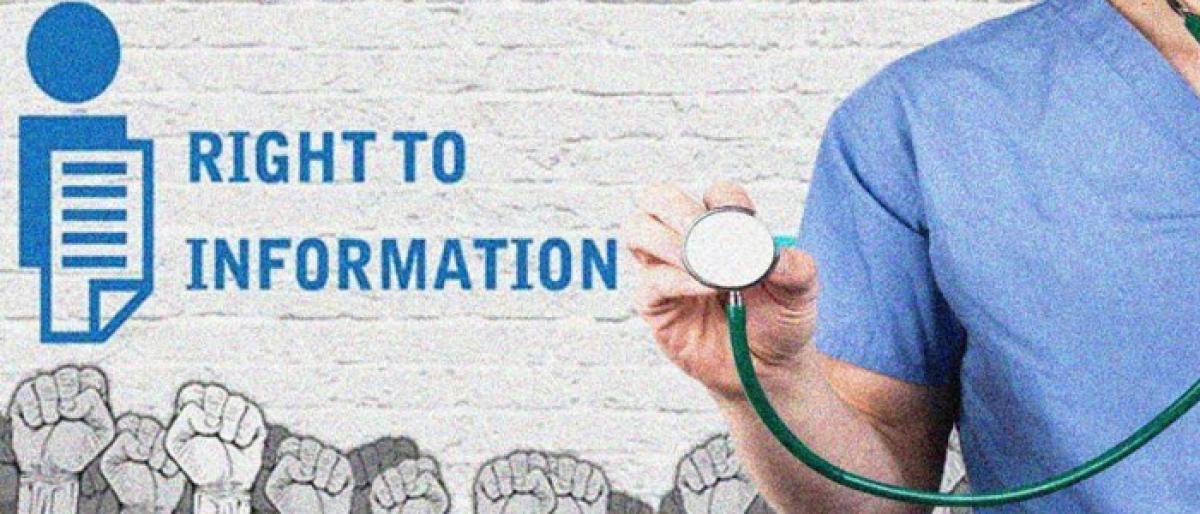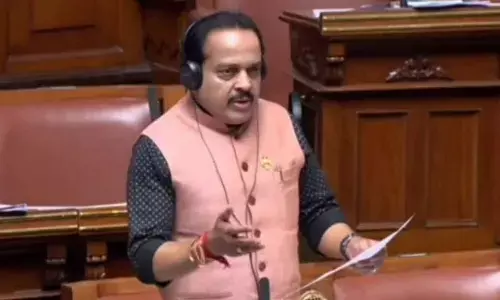Doctors can’t defy MCI on RTI

The Medical Council of India (MCI) has imposed an obligation on hospitals as per the regulations notified on 11th March 2002, amended up to December 2010 to maintain the medical records and provide patients access to them.
The Medical Council of India (MCI) has imposed an obligation on hospitals as per the regulations notified on 11th March 2002, amended up to December 2010 to maintain the medical records and provide patients access to them.
According ethics regulations of MCI, Maintenance of Medical Records invovles: 1.3.1. Every physician shall maintain the medical records pertaining to his/her indoor patients for a period of three years from the date of commencement of the treatment in a standard proforma laid down by the Medical Council of India and attached as Appendix 3; and, 1.3.2. If any request is made for medical records either by the patients/authorised attendant or legal authorities involved, the same may be duly acknowledged and documents shall be issued within the period of 72 hours.
In Ozair Husain Vs Union of India, the bench of A D Singh and M Mudgal emphasised that a consumer had right to information. It could be right to information about service or product, so that he can find out whether service or goods are defective and claim damages. In this PIL, the petitioner sought a direction to disclose voluntarily as to whether food product that is being sold contains elements from animals or not.
In this case, the relationship between Right to Information and freedom of expression was discussed. The bench said: "freedom of expression enshrined in Article 19(1)(a) can serve two broad purposes (1) it can help the consumer to discover the truth about the composition of the products, whether made of animals including birds and fresh water or marine animals or eggs; and (2) it can help him to fulfill his belief or opinion in vegetarianism."
International RTI
Article 10 of the European Convention on Human Rights provides that everyone has a right to freedom of expression and this right shall include freedom to hold opinions and to receive information and ideas without interference by public authority and regardless of frontiers. Article 19(1) and 19(2) of the International Covenant on Civil and Political Rights declares that everyone shall have the right to hold opinions without interference, and every one shall have the right to freedom of expression, and this right shall include freedom to seek, receive and impart information of ideas of all kinds regardless of frontiers, either orally, in writing or in print, in the form of art, or through any other media of his choice. It needs to be noted that India is a signatory to the aforesaid convention..... Right to hold opinions and to receive information and ideas without interference embodied in the Covenant is concomitant to the right to freedom of speech and expression which includes right to free flow of information.
Rigveda says:
“Aa no bhadrah kratavo yantu vishwatah” (= May auspicious thoughts come to us from all over the world)
Since ancient times we have allowed noble thoughts to come from all sides as proclaimed by Rig Veda. This has helped in forming, building, strengthening, nurturing, replenishing and recreating opinions and beliefs of an individual... Reading Article 19(1)(a) along with the Covenant, it must be recognised that right to freedom of speech and expression includes freedom to seek, receive and impart information of ideas. It seems to us that freedom to hold opinions, ideas, beliefs and freedom of thought, etc., which is also enshrined in Preamble to the Constitution, is part of freedom of speech and expression. Every person has freedom of choice. But how can he exercise the choice without having complete information?
Information about food products
The Bench observed that where packages of food products, drugs and cosmetics do not disclose any information in writing and by an appropriate symbol about the composition of the products contained therein, right to freedom of conscience of the consumers is violated as they may be unconsciously consuming a product against their faiths, beliefs and opinions. The Bench held, “that it is the fundamental right of the consumers to know whether the food products, cosmetics and drugs are of nonvegetarian or vegetarian origin, as otherwise it will violate their fundamental rights under Article 19(1)(a), 21 and 25 of the Constitution”. Regarding food products the Bench observed that adequate provisions have been made for informing the consumers as to whether or not the article of food is vegetarian or nonvegetarian.
RTI about drugs and cosmetics
The Delhi High Court Bench in Ozair Hussain case explained that as regards drugs and cosmetics, necessary amendments have not been made in the relevant statutes. In so far as a life-saving drug is concerned, there is a view point that the information: whether or not it is derived or manufactured, wholly or partly, from an animal, should not be disclosed since it is meant to fight disease and save life.
The division bench of Delhi High Court directed as follows till such time the requisite amendments are carried out:
1)Where a cosmetic or a drug other than life-saving drug, as the case may be, contains ingredients of nonvegetarian origin, the package shall carry label bearing the following symbol in red colour on the principal display panel just close in proximity to name or brand name of the drug or cosmetic :
2)Where a cosmetic or a drug other than life-saving drug, as the case may be, contains ingredients wholly of vegetarian origin, the package shall bear the following symbol in green colour on the principal display panel just close in proximity to name or brand name of the drug or cosmetic:
3)Where a cosmetic or a drug other than life saving drug has ingredients of vegetarian or nonvegetarian origin, a declaration shall be made in writing on the package indicating the nature of the origin of the product.
4) The Director General of Health Services/Drugs Controller General, Govt. of India, shall issue a list of Life Saving Drugs within a period of two months.
Securing rights of the consumers, the division bench of Delhi High Court issued substantial directions:
(i)to protect the rights of innocent conscientious consumers who object to the use of animals in whole or in part or their derivatives in food, cosmetics and drugs, etc., by making the manufacturers and packers thereof to disclose the ingredients of the aforesaid products so that they make an informed choice with regard to their consumption;
(ii)to the manufacturers and packers of cosmetics, drugs and articles of food for complete and full disclosure of the ingredients of their products being sold to consumers;
(iii)a declaration that the consumers have a right of making an informed choice between the products made or derived from animal and nonanimal ingredients; and
(iv) a direction to the manufacturers and packers of food, cosmetic and drugs that the products made from animals should bear an easily identifiable symbol conveying that it has an animal ingredient. "
The above judgment deals with right to information to exercise their choices and beliefs under Consumer Protection Act. Extending this principle derived from Articles 21 and 19 of our Constitution, a consumer of medical services too has a right to know what treatment was given to him/her, what were the reports of diagnostic tests, what were the opinions expressed by doctors or specialists, why he/she was kept in hospital etc.
The consumer's right to information extends both to the products and services, including medical service. It lies basically rooted in the foundations of liberty, the choice over his own body with reference to treatment.















